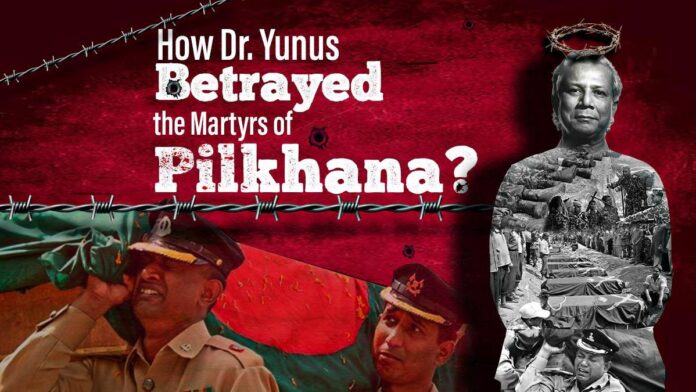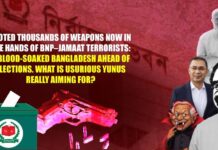Recently, the release of 27 former BDR (Bangladesh Rifles, now Border Guard Bangladesh – BGB) personnel from Kashimpur Jail, followed by the bail approval for 178 others linked to the horrific Pilkhana massacre, is not a simple legal development—it is a calculated act of betrayal. This decision, executed under the newly-installed Yunus-led interim government, delivers a direct insult to the memory of the 74 martyrs—most notably the 57 army officers—who were brutally murdered during the mutiny in 2009. Their blood was spilled in an act of treason so horrifying that it shook the foundations of the Republic. The very institution that once symbolized national pride and security—the Bangladesh Army—has now been humiliated by a government cloaking itself in the language of civility and reform. This is not justice. This is not progress. This is political orchestration at its most cynical.
The so-called “interim” administration of Dr. Muhammad Yunus, lauded abroad but deeply divisive at home, has made a decision that no previous government dared to consider. Whatever criticisms one may have of Sheikh Hasina’s tenure—and there are many—her administration never allowed for the possibility of clemency for the perpetrators of the Pilkhana atrocity. In contrast, Yunus’s regime has prioritized ideological disruption and foreign appeasement over national memory and institutional honor.
To frame this as a routine legal procedure is to insult the intelligence of the nation. The timing, the coordination, and the silence from key state institutions all suggest something far more sinister: a deliberate effort to rewrite history and redefine accountability. Bangladesh now stands at a crossroads, facing not just political instability, but moral collapse.
The Pilkhana Massacre: A National Trauma
On February 25–26, 2009, Bangladesh witnessed one of the darkest chapters in its history. Mutinous BDR (Bangladesh Rifles) jawans, armed and enraged, launched a violent revolt against their commanding officers at the Pilkhana headquarters. What began as a grievance-fueled protest quickly escalated into a brutal massacre. High-ranking army officers were mercilessly executed, their families traumatized, and the nation’s sense of security shaken to its core. The events at Pilkhana were not merely a mutiny—they constituted a calculated act of mass murder that struck at the heart of Bangladesh’s military discipline and national unity.
In response, the state initiated a meticulous and far-reaching investigation, resulting in one of the largest and most complex trials in the country’s legal history. Justice was served in 2013 when a Dhaka court sentenced 150 BDR personnel to death and handed life imprisonment to 160 others. These verdicts were later upheld by the High Court in 2017, affirming the state’s commitment to justice and national integrity. At that critical juncture, Bangladesh sent a strong signal to both its citizens and the international community: betrayal of the nation would not be tolerated.
However, that hard-earned moral stance now stands jeopardized. Recent actions by the Yunus government have cast a shadow over this historic assertion of justice. By undermining the gravity of the 2009 massacre and offering concessions that appear to disregard the victims’ memories, the government risks reversing the message that justice and national security are non-negotiable. Such actions threaten not only the legacy of justice achieved but also the fragile trust between the state and its armed forces. National betrayal, once punished, should not now be politically sanitized.
The Politics Behind the Pardon
It is no coincidence that the bail for these individuals comes at a time when Yunus and his administration are desperately trying to reframe the political order under the guise of moral rehabilitation and economic reform. Nobel laureate Dr. Muhammad Yunus, long criticized for his overt internationalist approach to domestic issues, now appears to be using his premiership to rewrite the moral compass of Bangladesh.
One must ask: What kind of reform justifies the release of men associated with the murder of 57 army officers? What message does this send to the rank and file of our defense forces? That their blood is expendable? That their sacrifice can be erased by a stroke of a political pen?
This decision reflects a larger ideological rift between the current government and the foundational values of our Republic. In the name of progress, the new government is unmaking the hard-won national cohesion built over decades—starting with the very guardians of our sovereignty.
Complicity of the Present-Day Army Leadership
Even more alarming than the political maneuvering is the deafening silence of the current military leadership. Where is the outrage? Where are the voices of our top brass condemning the release of those responsible for the brutal killing of their fellow officers? The military—once regarded as the ultimate guardian of justice and institutional integrity—now appears disturbingly passive, if not complicit.
This is nothing less than a slap in the face of the Army. Officers were murdered, women violated, and yet, under the very watch of today’s leadership, the perpetrators have been set free. This betrayal of justice is a stain on the institution. By remaining silent, the Army is failing in its duty to honor the sacrifices of its own. Inaction, in this case, is not neutrality—it is acquiescence.
The Army’s failure to resist or even question such a decision sends a chilling message. It suggests that political expediency now outweighs institutional loyalty, historical memory, and military honor. What message does this send to the younger generation of soldiers—those who joined the service inspired by the valor and sacrifice of the fallen? That justice is negotiable? Is silence in the face of betrayal acceptable?
A military that does not stand up for its own, that allows the blood of its heroes to be forgotten for political convenience, loses not only its moral compass but its legitimacy. Leadership is not just about discipline and command; it is about courage—the courage to speak out when silence is a betrayal.
This moment demands a reckoning. The legacy of the fallen must not be bartered away. Justice must not be silenced. And the conscience of the Army must not remain asleep.
A Dangerous Precedent for the Rule of Law
Beyond the betrayal of the armed forces, the release of these convicts signals a disturbing trend in the manipulation of the judiciary. It stretches credibility to suggest that this was a decision taken in an apolitical vacuum. When 27 men associated with an act of national treason are released in one sweep, with 178 more lined up for similar reprieve, one can no longer claim that the judiciary operates independently.
Yunus’s government, for all its talk of institutional reform, is now undermining the very institutions that uphold our democracy. Justice, accountability, and rule of law are not optional principles to be picked up and dropped based on political convenience.
It is ironic—tragic, even—that the same international community that heralded Yunus as a beacon of peace and reform is now silent. Western diplomats, human rights organizations, and UN agencies that previously condemned the Pilkhana massacre have so far failed to comment on the bail granted to the accused. Would they have remained silent had such an atrocity occurred in their own nations, followed by a political pardon?
Their silence emboldens the very forces that seek to destabilize fragile democracies. It encourages a narrative where “reconciliation” becomes a cover for impunity, and “justice reform” becomes a euphemism for erasing historical memory.
The Real Cost of Compromise
A nation that forgets its martyrs is doomed to fall into an abyss of moral confusion and political chaos. Bangladesh must remember what happened at Pilkhana—not just as a tragic event, but as a defining moment that tested our national resilience. The officers who died were not just victims; they were guardians of our Republic. Their murderers are not victims of circumstance; they are perpetrators of treason.
If the current government chooses to forget, the people must not. If the military leadership chooses to remain silent, the veterans and families of the martyrs must raise their voices. If the judiciary is being weaponized for political ends, the legal community must rise in defiance.
The Yunus-led government has made its position clear: in the name of “moving forward,” it is willing to walk over the graves of our martyrs. It is willing to legitimize one of the worst acts of institutional betrayal in our history. And worst of all, it is willing to alienate the very forces that have kept this nation from falling apart in times of crisis. But this is not progress. This is perversion.
The Pilkhana massacre was more than a mutiny—it was a wound to our collective soul. Releasing its perpetrators is not justice; it is a desecration. And it is a desecration for which the Yunus government must be held accountable.
References:
The Daily Star. (2023, February 25). Unanswered questions about the Pilkhana massacre.
Dhaka Tribune. (2025, March 19). Pilkhana BDR mutiny incident gains new momentum after 16 years.
Dhaka Tribune. (2025, January 23). Over 300 BDR members being freed on bail after 16 years.





